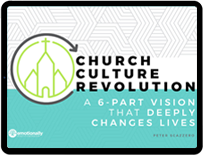EQ vs. EHS
Studies indicate that EQ (emotional quotient) is so critical that it accounts for 58 percent of performance in all types of jobs. In fact, emotional intelligence in the workplace trumps almost every other factor — IQ, personality, education, experience, and gifts — when it comes to effective performance. Businesses rely on emotional intelligence (EQ) to help employees learn key personal competencies (e.g. self-awareness, basic management of their triggers) and social skills (e.g. empathy, conflict management). Our concern in emotional healthy spirituality (EHS), however, is much more than this. We are after long-term inner transformation for the sake of the world. Our goal is that Jesus Christ be formed in us. The greatest difference between EQ and EHS is that we worship and follow a crucified God. His will and presence informs all we do. We don’t simply learn conflict resolution tools, for example, to be more effective at work. Our motivation, above all else,. Read more.





